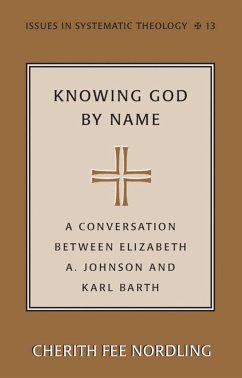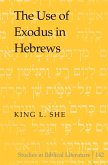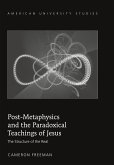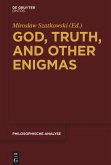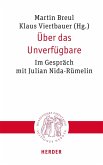Does women's experience matter for theological inquiry? Elizabeth Johnson's premise is that it does, and that the failure of traditional Trinitarian doctrine to account for women's relationality results in a too radical distinction between God and the world. Drawing on feminist ethics and God-talk, transcendental experience, and panentheistic Trinitarian theology, she constructs an alternative relational ontology and Trinitarian female symbol. Is her integration of these multiple systems viable? More importantly, can divine and human freedom, distinction and personhood be upheld within Johnson's framework?
Knowing God by Name is a critical assessment and evaluation of this approach, bringing Johnson into conversation with Catholic and feminist colleagues and with Karl Barth, whose Trinitarian theology of experience maintains the divine-creaturely distinction she challenges. It asks whether her combination of Rahnerian anthropology, panentheistic relational ontology and feminist God-talk is internally consistent and methodologically plausible. Knowing God by Name thoughtfully examines Johnson's claim to speak within the contours of historical, Trinitarian Christianity and her contribution to the life and language of the Church today.
Knowing God by Name is a critical assessment and evaluation of this approach, bringing Johnson into conversation with Catholic and feminist colleagues and with Karl Barth, whose Trinitarian theology of experience maintains the divine-creaturely distinction she challenges. It asks whether her combination of Rahnerian anthropology, panentheistic relational ontology and feminist God-talk is internally consistent and methodologically plausible. Knowing God by Name thoughtfully examines Johnson's claim to speak within the contours of historical, Trinitarian Christianity and her contribution to the life and language of the Church today.
«'Knowing God by Name' constitutes a penetrating analysis and critique of Elizabeth Johnson's theology with a view toward seeing how her concern to speak truly of God might actually be accomplished through a more rigorous understanding of divine and human freedom than she is able to offer. Dr. Nordling carries this out with clear-sighted theological perception and an impressive ability to articulate the fundamental conceptual issues with the utmost lucidity.» (Alan J. Torrance, Professor of Systematic Theology, University of St. Andrews, Scotland)
«As counter-intuitive as it might seem, the future of feminism in the Church may depend in the long run on how well Christian feminism can be accommodated by Nicene Christianity. In this groundbreaking work, Cherith Fee Nordling makes a crucial move in this direction. By subjecting the work of a major feminist theologian to meticulous examination, she sorts through the issues with the help of Karl Barth, placing essential feminist concerns on a new theological foundation.» (George Hunsinger, Hazel Thompson McCord Professor of Systematic Theology, Princeton Theological Seminary)
«'Knowing God by Name' seeks to carve out a balanced, charitable critique of one of the foremost contemporary feminist theologians in the United States. Cherith Fee Nordling sets the Roman Catholic Elizabeth A. Johnson in ecumenical conversation with one of the foremost Protestant European theologians of the twentieth century, Karl Barth. This study is a must-read for all who crave the justice demands of feminist theology, as well as for those who are perplexed and even repelled by them. All who are willing to continue to examine the often implicit and even hidden agendas in contemporary theological scholarship and ecclesial ministry will benefit from a careful reading of this new work.» (Rev. Kathryn Greene-McCreight, PhD, Associate Priest, St John's Episcopal Church, New Haven, CT. Author of Feminist Reconstructions of ChristianDoctrine)
«As counter-intuitive as it might seem, the future of feminism in the Church may depend in the long run on how well Christian feminism can be accommodated by Nicene Christianity. In this groundbreaking work, Cherith Fee Nordling makes a crucial move in this direction. By subjecting the work of a major feminist theologian to meticulous examination, she sorts through the issues with the help of Karl Barth, placing essential feminist concerns on a new theological foundation.» (George Hunsinger, Hazel Thompson McCord Professor of Systematic Theology, Princeton Theological Seminary)
«'Knowing God by Name' seeks to carve out a balanced, charitable critique of one of the foremost contemporary feminist theologians in the United States. Cherith Fee Nordling sets the Roman Catholic Elizabeth A. Johnson in ecumenical conversation with one of the foremost Protestant European theologians of the twentieth century, Karl Barth. This study is a must-read for all who crave the justice demands of feminist theology, as well as for those who are perplexed and even repelled by them. All who are willing to continue to examine the often implicit and even hidden agendas in contemporary theological scholarship and ecclesial ministry will benefit from a careful reading of this new work.» (Rev. Kathryn Greene-McCreight, PhD, Associate Priest, St John's Episcopal Church, New Haven, CT. Author of Feminist Reconstructions of ChristianDoctrine)

